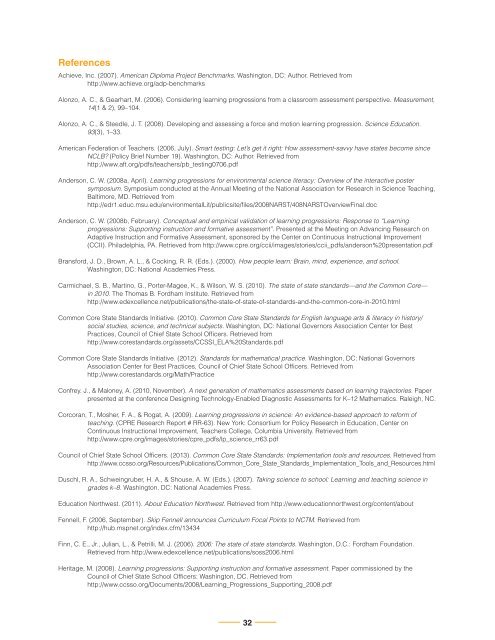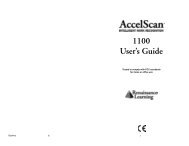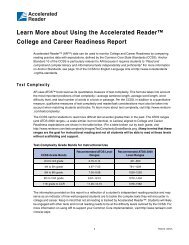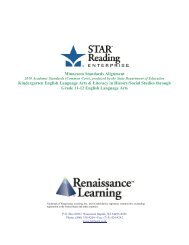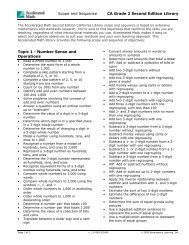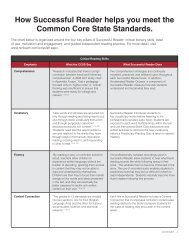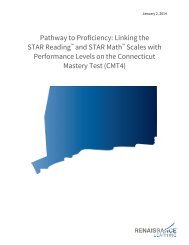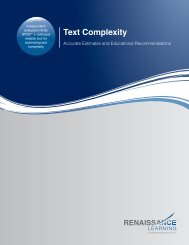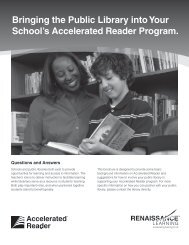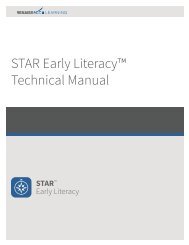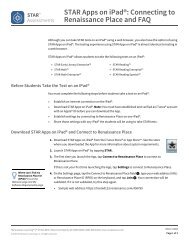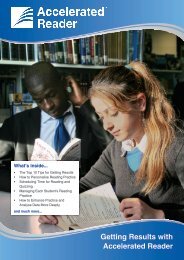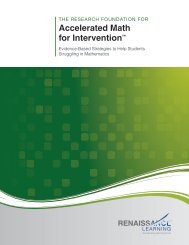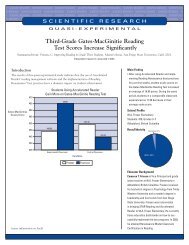Core Progress⢠for Math - Renaissance Learning
Core Progress⢠for Math - Renaissance Learning
Core Progress⢠for Math - Renaissance Learning
You also want an ePaper? Increase the reach of your titles
YUMPU automatically turns print PDFs into web optimized ePapers that Google loves.
ReferencesAchieve, Inc. (2007). American Diploma Project Benchmarks. Washington, DC: Author. Retrieved fromhttp://www.achieve.org/adp-benchmarksAlonzo, A. C., & Gearhart, M. (2006). Considering learning progressions from a classroom assessment perspective. Measurement,14(1 & 2), 99–104.Alonzo, A. C., & Steedle, J. T. (2008). Developing and assessing a <strong>for</strong>ce and motion learning progression. Science Education.93(3), 1–33.American Federation of Teachers. (2006, July). Smart testing: Let’s get it right: How assessment-savvy have states become sinceNCLB? (Policy Brief Number 19). Washington, DC: Author. Retrieved fromhttp://www.aft.org/pdfs/teachers/pb_testing0706.pdfAnderson, C. W. (2008a, April). <strong>Learning</strong> progressions <strong>for</strong> environmental science literacy: Overview of the interactive postersymposium. Symposium conducted at the Annual Meeting of the National Association <strong>for</strong> Research in Science Teaching,Baltimore, MD. Retrieved fromhttp://edr1.educ.msu.edu/environmentalLit/publicsite/files/2008NARST/408NARSTOverviewFinal.docAnderson, C. W. (2008b, February). Conceptual and empirical validation of learning progressions: Response to “<strong>Learning</strong>progressions: Supporting instruction and <strong>for</strong>mative assessment”. Presented at the Meeting on Advancing Research onAdaptive Instruction and Formative Assessment, sponsored by the Center on Continuous Instructional Improvement(CCII). Philadelphia, PA. Retrieved from http://www.cpre.org/ccii/images/stories/ccii_pdfs/anderson%20presentation.pdfBrans<strong>for</strong>d, J. D., Brown, A. L., & Cocking, R. R. (Eds.). (2000). How people learn: Brain, mind, experience, and school.Washington, DC: National Academies Press.Carmichael, S. B., Martino, G., Porter-Magee, K., & Wilson, W. S. (2010). The state of state standards—and the Common <strong>Core</strong>—in 2010. The Thomas B. Fordham Institute. Retrieved fromhttp://www.edexcellence.net/publications/the-state-of-state-of-standards-and-the-common-core-in-2010.htmlCommon <strong>Core</strong> State Standards Initiative. (2010). Common <strong>Core</strong> State Standards <strong>for</strong> English language arts & literacy in history/social studies, science, and technical subjects. Washington, DC: National Governors Association Center <strong>for</strong> BestPractices, Council of Chief State School Officers. Retrieved fromhttp://www.corestandards.org/assets/CCSSI_ELA%20Standards.pdfCommon <strong>Core</strong> State Standards Initiative. (2012). Standards <strong>for</strong> mathematical practice. Washington, DC: National GovernorsAssociation Center <strong>for</strong> Best Practices, Council of Chief State School Officers. Retrieved fromhttp://www.corestandards.org/<strong>Math</strong>/PracticeConfrey. J., & Maloney, A. (2010, November). A next generation of mathematics assessments based on learning trajectories. Paperpresented at the conference Designing Technology-Enabled Diagnostic Assessments <strong>for</strong> K–12 <strong>Math</strong>ematics. Raleigh, NC.Corcoran, T., Mosher, F. A., & Rogat, A. (2009). <strong>Learning</strong> progressions in science: An evidence-based approach to re<strong>for</strong>m ofteaching. (CPRE Research Report # RR-63). New York: Consortium <strong>for</strong> Policy Research in Education, Center onContinuous Instructional Improvement, Teachers College, Columbia University. Retrieved fromhttp://www.cpre.org/images/stories/cpre_pdfs/lp_science_rr63.pdfCouncil of Chief State School Officers. (2013). Common <strong>Core</strong> State Standards: Implementation tools and resources. Retrieved fromhttp://www.ccsso.org/Resources/Publications/Common_<strong>Core</strong>_State_Standards_Implementation_Tools_and_Resources.htmlDuschl, R. A., Schweingruber, H. A., & Shouse, A. W. (Eds.). (2007). Taking science to school: <strong>Learning</strong> and teaching science ingrades k–8. Washington, DC: National Academies Press.Education Northwest. (2011). About Education Northwest. Retrieved from http://www.educationnorthwest.org/content/aboutFennell, F. (2006, September). Skip Fennell announces Curriculum Focal Points to NCTM. Retrieved fromhttp://hub.mspnet.org/index.cfm/13434Finn, C. E., Jr., Julian, L., & Petrilli, M. J. (2006). 2006: The state of state standards. Washington, D.C.: Fordham Foundation.Retrieved from http://www.edexcellence.net/publications/soss2006.htmlHeritage, M. (2008). <strong>Learning</strong> progressions: Supporting instruction and <strong>for</strong>mative assessment. Paper commissioned by theCouncil of Chief State School Officers: Washington, DC. Retrieved fromhttp://www.ccsso.org/Documents/2008/<strong>Learning</strong>_Progressions_Supporting_2008.pdf32


